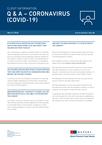
Q & A – Coronavirus (COVID-19)
If an infection is suspected, may the employer ask his employees where they have spent their holidays or other travels?
Yes, if the employer suspects a possible infection, for example, when an employee returns from a stay abroad or for other reasons, he is entitled to ask the employee in general whether he has stayed in a region or place for which a corresponding risk of infection is known. However, the employee is not obliged to give detailed information about the journey or the place of stay.
Can the employer ask employees to state whether they have spent holidays in a designated risk area before they return to work?
In principle, yes, here too the general assumption of a possible infection applies. Depending on the destination, the employer must then weigh the risk of employment in the company against the interests of the employee.
When reporting sick / incapacity to work, can the employer specifically ask about the reason for the illness?
In principle, no, but the concrete inquiry as to whether a notifiable infectious disease has been diagnosed must be regarded as admissible based on the employer's obligation to report such a disease (obligation to report under the Infection Protection Act (IfSG)
How must the employer react if a case occurs in the company?
Because of the obligation to report infections under the Infection Protection Act (IfSG), the relevant health authority must be informed (obligation to report).
The competent authority can be found on the website of the Robert Koch Institute.
The employee concerned should not have any further contact with other employees in case of suspicion until he can be brought - if possible after instruction by the health authority - to the examination and performance of a test (COVID-19 Test).
The employee must be released from work with pay until the results of the test have been determined.
The other employees must be interviewed to determine who has had direct contact with the employee in question. In case of suspicion, the procedure is to be the same as before.
In agreement with the health authorities, the other employees are to be released from work with continued pay, depending on the risk, in order to protect them. Under certain circumstances, the company may have to close down partially or completely.
Will employees continue to receive money if the company closes?
In the event of the closure of an entire company due to an official order, it must be assumed at this time that this falls within the company's business risk. This means that the company also bears the risk of continued payment of wages.
Whether this will actually be handled in this way in the specific case of a pandemic or whether state compensation payments will be granted in such a case cannot be said at present.
As an employer, can I apply for short-time work compensation if I have order bottlenecks due to the coronavirus?
Yes, if the company is no longer working to capacity due to a lack of goods deliveries and accessories in connection with the corona virus, short-time work can be applied for.
The prerequisite for the granting of so-called cyclical short-time working compensation is a considerable loss of work with loss of pay within the meaning of Sec. 96 para. 1 No. 4 German Social Code III, GSC III. If short-time work cannot be avoided in the business despite all efforts, such a loss of deliveries due to the consequences of the coronavirus as an unavoidable event within the meaning of Sec. 96 para. 1 No. 1 GSC III may make it possible to grant short-time work compensation.
Application deadline:
Short-time work compensation must be applied for for the respective calendar month within a cut-off period of three calendar months, beginning at the end of the month in which the days for which the benefits are applied for lie (Sec. 325 para. 3 GSC III).
What must the employer do to protect his employees from infections?
The employer should inform the employees in good time about how they can protect themselves against infection, what must be done in the event of a suspected or diagnosed illness and who is the contact person. Disinfection facilities should be made available.
Can employees stay at home as a preventive measure for fear of infection?
No, an unauthorised absence from work cannot be justified by fear of infection by others without concrete and demonstrable reasons and usually leads to a breach of contractual obligations (unexcused absence), loss of entitlement to remuneration and may in individual cases have consequences under employment law up to and including termination without notice.
What regulations apply to business trips? Is the employer obliged to prohibit/cancel business trips?
The employer should not be obliged to prohibit business trips that do not lead to high-risk regions, unless special risks arise from the choice of means of transport, the travel route (e.g. through endangered areas) or the nature of the business activity (e.g. attending a congress with a large number of participants), which the employer must take into account as part of its duty of care.
When it comes to the employee's obligation to undertake business trips, the question of whether the employee may refuse to undertake business trips to areas for which there is a travel warning (travel warnings of the Federal Foreign Office (“Auswärtiges Amt”)) or which are otherwise designated as risk areas (list of the Robert Koch Institute) should also be relevant.
An instruction to this effect from the employer to undertake business trips in risk areas is likely to be ineffective due to a breach of the employer's general duty of care. The employee will not have to comply with such an instruction and does not face consequences under labour law.
Is the supervisor allowed to send recognisably ill employees home?
As far as it is not already a notifiable illness (see above):
When weighing up the employer's operational interests and the personal interests of the employee, the employer can also release the employee from performing work - with continued payment of remuneration. This may be necessary in particular if the employment of the employee cannot be justified for reasons of the employer's general duty of care or for reasons of occupational health and safety (Sec. 4 no. 1 Labour Protection Act, LPA).
As a rule, a release from work considering vacation is only possible if this has been agreed in the employment contract.
Is the employee still to be paid wages if he or she falls ill?
Yes, as in the case of any other illness, the employee is entitled to continued payment of his or her salary even if he or she is infected with the corona virus (Sec. 3 para. 1 Continued Remuneration Act).
What is the situation with regard to wage payment if an employee is banned from work or quarantined?
If the employee is subject to an employment ban or quarantine has been ordered for him, the employer is usually exempt from his obligation to pay remuneration.
In these cases, the employer is not entitled to continued wage payment, but the wage payment is initially made by the employer, who has a corresponding claim to be reimbursed by the German authorities.
According to the regulations of the Protection against Infection Act (IfSG), compensation will be paid upon application if the prerequisites are met in accordance with Sec. 56 IfSG. An advance payment is to be granted to the employer upon application.
Application deadline:
The application for reimbursement must be submitted to the competent authority within three months after the cessation of the prohibited activity (Sec. 56 para. 11 IfSG).
Can overtime be ordered if too few employees are able to work due to corona infection?
Yes, if a large number of employees fall ill, this can lead to a situation where the staff situation is an emergency situation, and this poses a danger to the company's facilities, goods or workplaces.
Employees are then obliged to work overtime to the extent permitted by law, including by unilateral order of the employer, even if this is not stipulated in the employment contract.
Can employees stay at home when the daycare or school is closed?
No, in principle the employee is not exempt from the obligation to work if the day nursery or school attended by his own child is closed. In individual cases, however, the employee may be entitled to be released from work, but without the employer being obliged to continue to pay if his or her own child is not ill.
What happens when an employee’s own child is ill or a close relative?
If an employee’s own child or close relative is affected by the illness, the employee can stay away from work with continued pay to a certain extent, provided this does not exceed a disproportionate period of time (Sec. 616 German Civil Code (GCC)). There are no fixed upper limits. In the case of close relatives, 5 days can be assumed as a guideline, and in the case of children up to the age of 12, between 10 and 20 days per child.
However, it must be considered that Sec. 616 GCC is excluded in many employment contracts and is then not applicable.
Can the employer unilaterally order vacation?
No, as a rule the employer cannot unilaterally order employees to take their vacation.
Can the employer refuse vacation?
Yes, under special circumstances, vacation can be refused, especially if a lack of staff due to the viral disease considerably effects operational processes.
If the company has a works council, it is possible to regulate company holidays within the framework of a works agreement. This agreement then has priority over the wishes of the employee.
Can the employee demand to perform his work in the home office and/or can the employer demand this from him?
No, there is no unilateral right of the employee to carry out his activity (as far as possible) in the Home-Office as well, if this is not regulated by an employment contract.
Whether an employee exceptionally has the right to carry out his work in the home office if several employees are already ill is also rather questionable. Also, in these cases it is recommended to conclude a corresponding agreement.
Nor can the employer unilaterally order the work in the home office without an agreement having been reached.
In all cases in which the employment contract does not contain a regulation, an express agreement is required.
Are there any particularities to be observed with regard to data protection law?
The necessary disclosure of the data of an employee affected by the Corona virus involves the processing of personal data. This is lawful because it is carried out to fulfil the employer's duty of care under the employment contract and to protect the health and life of the other employees (Art. 6 para. 1 lit. b), d) and f) General Data Protection Regulation of the European Union (GDPR)).
Information Sources
- Robert Koch Institute: www.rki.de
- Federal Ministry of Health: www.bmg.bund.de
- Federal Centre for Health Education (BZgA): www.infektionsschutz.de
- Federal Foreign Office: www.auswaertiges-amt.de
- World Health Organization: www.who.org




